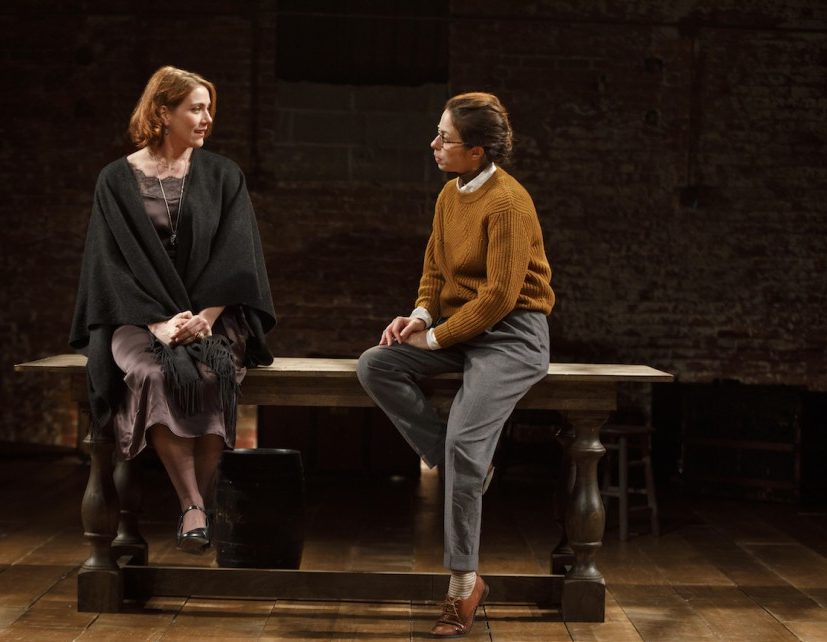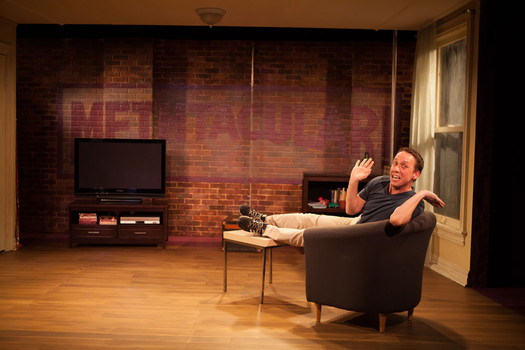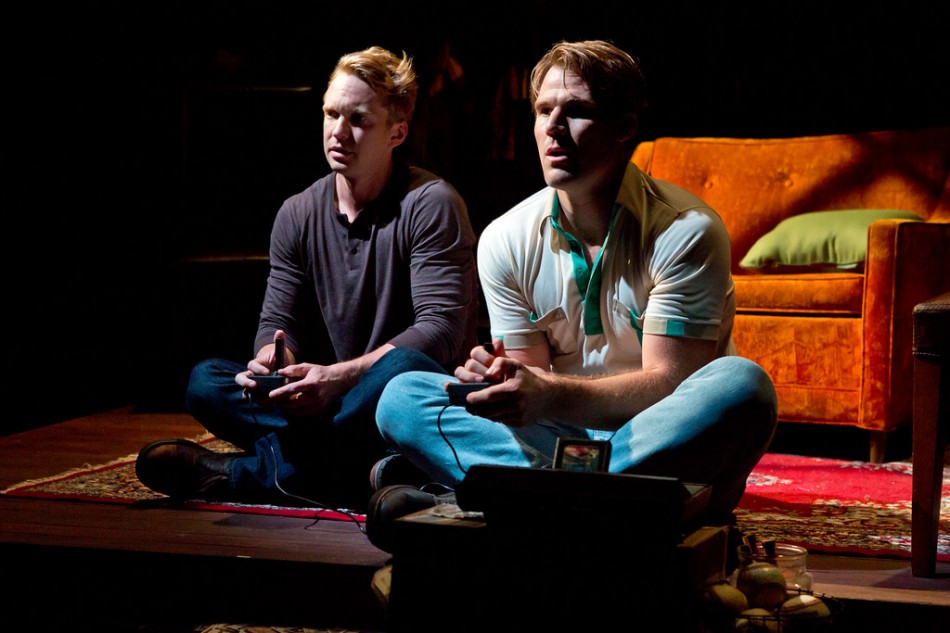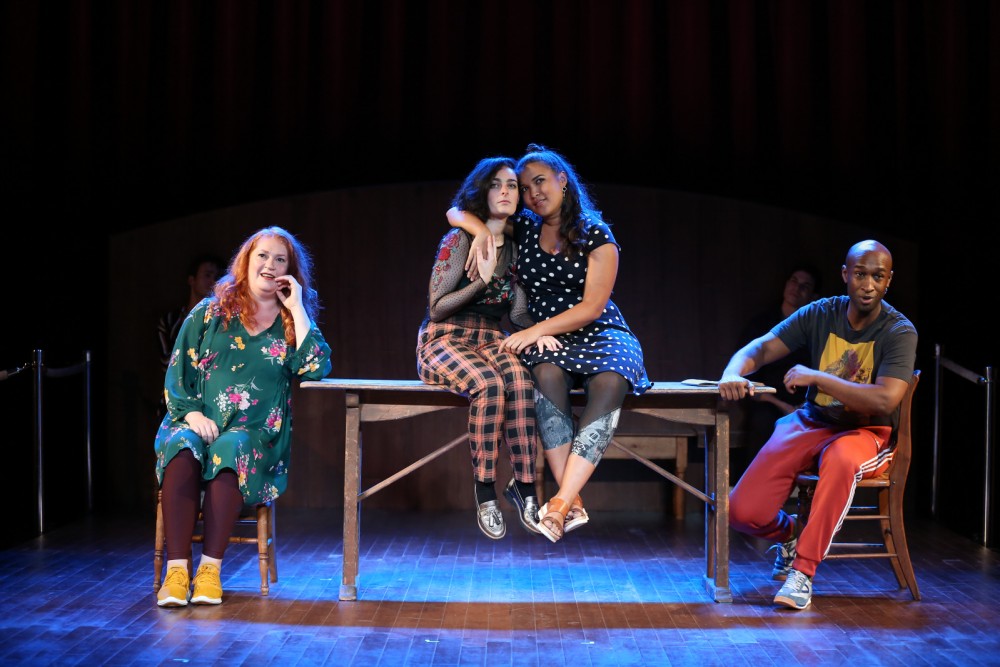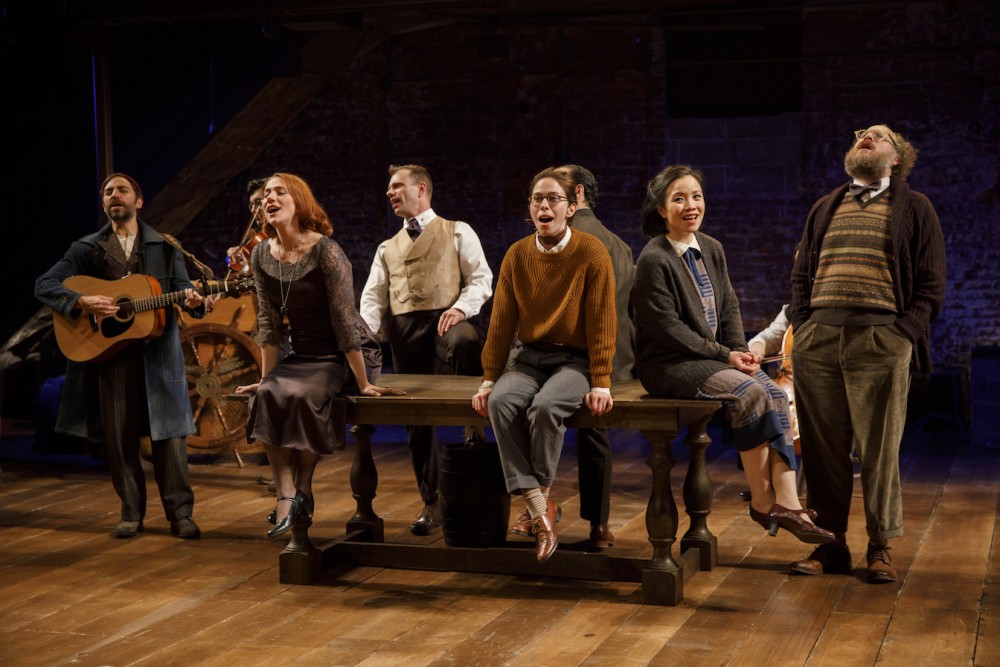
Ben Steinfeld, Jessie Austrian, Noah Brody, Emily Young, Tina Chilip, Andy Grotelueschen
by JK Clarke
Even among those who eschew Shakespeare plays, whatever their reason—language, content, repetition—the much beloved, comic masterpiece Twelfth Night, Or What You Will, is the rare exception. So beautifully written and perfectly paced, it’s a failsafe—sure to please even the most impatient of audiences when in the hands of a competent company. Thus, it is doubly confounding that Fiasco Theater’s (a bright, young company with a stellar track record) production at Classic Stage Company is one of the flattest and least amusing I’ve seen to date.
Fiasco Theater is built of solid, competent actors who’ve delivered beautiful productions of Shakespeare plays in the past, such as their much lauded 2015 version of the problematic Two Gentlemen of Verona at Theater for a New Audience. The production qualities of this Twelfth Night were pleasing enough: John Doyle’s wooden plank floorboard and 1920s era set required little makeover from CSC’s As You Like It earlier this fall; Emily Rebholz’s snazzy jazz era costumes; and Ben Stanton’s warm, comforting lighting. The disconnect, then, seems to have emerged from Directors Noah Brody (who also plays Orsino) and Ben Steinfeld’s decision to de-emphasize the play’s inherent deeply entrenched comedy.
In program notes Brody and Steinfeld discuss their focus on the “purpose, structure and rhythm” of the play’s prose while allowing the “ensemble a chance to explore their musical identities.” All well and good, but it seems, however, in the interim they simultaneously chose to ignore the outsized farce that makes up the core of the play.
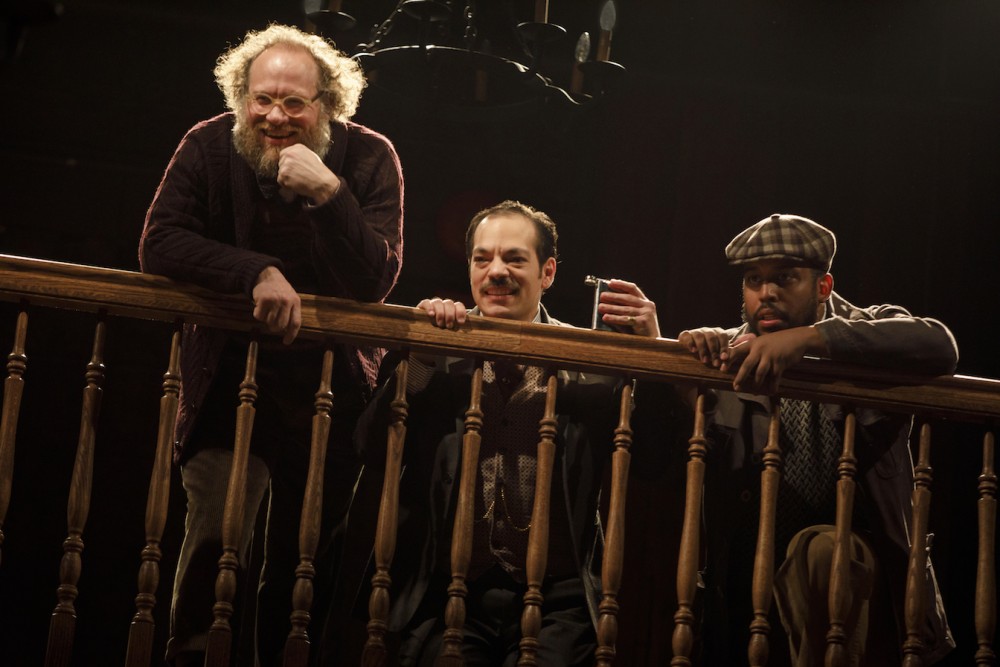

Andy Grotelueschen, Paco Tolson, David Samuel
Certainly it’s a company’s right to choose a less traditional approach to a play, to de-emphasize some material and heighten other. But the festival for which Twelfth Night is named, Epiphany—a Christian feast (with pagan origins) which was even more important than Christmas in Elizabethan times—was the “feast of fools and misrule,” before the hard work of the coming new year. It symbolized the battle between riotous excess and Puritanism (which, sadly, under Cromwell would completely close down English theaters from 1642-1660).
Twelfth Night is meant to be played for extreme laughs, in the style of commedia dell’arte, known for speedy reparté, subversive political messages and exaggeration of stock characters and themes. Central characters in the play include: Sir Toby Belch, Sir Andrew Aguecheek and Malvolio. The extremes and contrasts are right there in the names. Fiasco, however, chooses to mute the excesses. Sir Toby (Andy Grotelueschen) drinks, but is by no means the disruptive, outrageous and hilarious drunk he’s supposed to be. He, in fact, comes across quite reasonable and, well, dull. Meanwhile Aguecheek (Paco Tolson), supposedly a scrawny coward whose hair “hangs like flax on a distaff” is not the pathetic loser he’s meant to be, woefully miscast and mis-played as somewhat dapper, dark-haired and only modestly self-deluded. Try to imagine George Clooney playing Mr. Bean. Tolson would have made a fine Count Orsino, but his lack of comic chops make him wrong for the role he’s in. And Malvolio (Paul L. Coffey)—as written he’s a dark-souled, intolerant, Puritan bully—lacks any of the flame or fire that would invite the brutal retaliation eventually inflicted on him by the merrier members of the household. Even Olivia’s lady-in-waiting, Maria (delightfully played by Tina Chilip) misses opportunities for laughs. When she hisses at the departing Malvolio to “go shake your ears,” a line that elicits enormous laughs in every single Twelfth Night production I’ve seen, it’s merely a passive utterance that gets scarcely any notice at all.
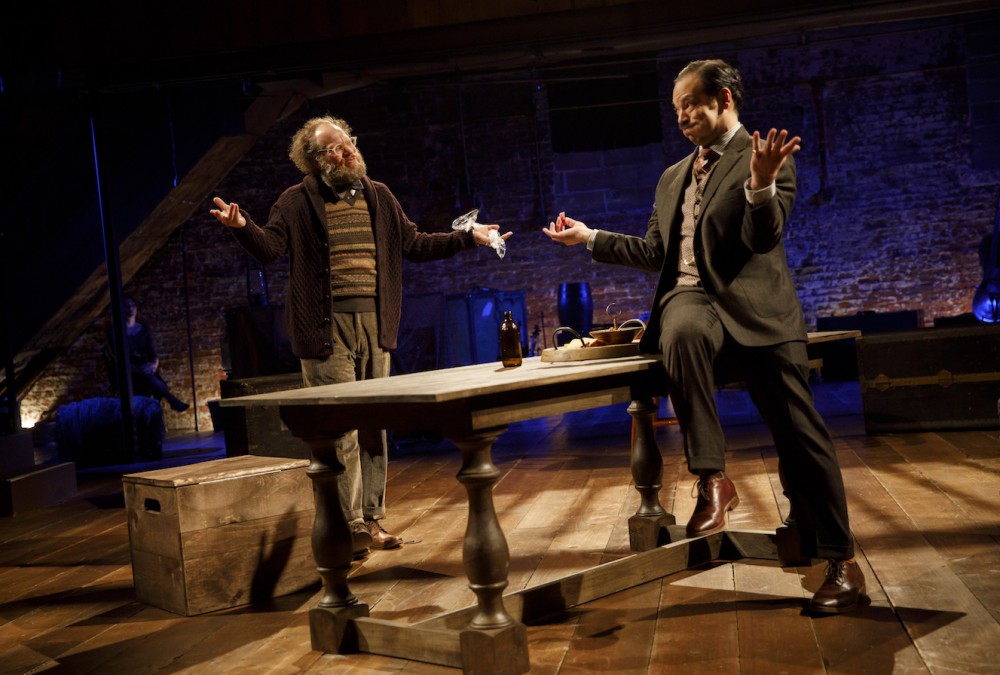

Andy Grotelueschen, Paco Tolson
Rather than working the perfectly primed dialog for the ready-and-waiting laughs it provides, it feels like the company invested its energy in charmingly performed inter-scene songs, including an unnecessary, storm-tossed Prologue (culled from—though not credited in the program—a 1992 ditty by Scottish-Canadian Jim Stewart called “The Marco Polo Suite”), which didn’t really fit with the play’s theme, story or style.
What characters did, instead, for laughs, particularly Steinfeld’s Feste, was use the audience almost the way a stand-up comedian would. When an audience member laughed noticeably loud, the actor would break the fourth wall and acknowledge him/her, eliciting further chuckles. It’s a method that works with more difficult plays, but Twelfth Night doesn’t need to work the audience to get laughs. They’re already there.
It seems like this production of Twelfth Night is suffering from a case of people working too hard to be unique and to avoid a clichéd production. But that doesn’t necessitate leaving the tomfoolery and madcap farce behind. That’s what the play was meant to be. Innumerable theater companies have mounted novel or unique versions of Twelfth Night without losing its humor to such an astonishing degree.
It should be noted that were this production played for laughs, there would have been several standout performances, from Emily Young’s sweet Viola, and even her brother Sebastian (Javier Ignacio) who looked like he should be leading pep rallies at an Ivy League school; to Jessie Austrian as a dynamic Olivia; and Steinfeld’s multi-layered Feste. But continually letting Shakespeare’s cleverest jokes die on the vine took the life out of their performances. Fiasco would be better served, and would better serve Shakespeare, by going back to breathing life into an otherwise neglected and dismissed play, something like All’s Well That Ends Well perhaps. Their take on Twelfth Night, unfortunately, serves little purpose and disappoints an expectant audience.
Twelfth Night, Or What You Will. Through January 6, 2018 at Classic Stage Company (136 East 13th Street, between Third and Fourth Avenues). www.classicstage.org
Photos: Joan Marcus


